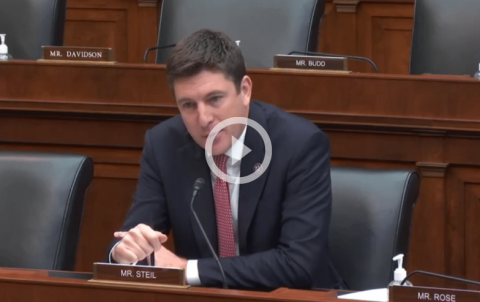Steil Questions FTX CEO on Collapse, Highlights Dangers of Overseas Crypto Companies
WASHINGTON, DC – Today, Congressman Bryan Steil (WI-01) questioned FTX CEO John Ray on the recent FTX collapse. During the questioning, Mr. Ray revealed the Bahamian authorities “pushback” when asked for transparency has been “extraordinary, irregular, and raises questions.” Ray’s comments indicated that Bahamian authorities appear to have taken money that could have been used repay American families who lost funds.
Watch Rep. Steil’s full testimony and questions below.

Full transcript:
Steil: Thank you Mr. Ray for being here. There’s a lot of questions about early stage due diligence with FTX, the timing of the indictment, but as policy makers we’re here to understand the collapse and what can be done to prevent future fraud like this from ever occurring again where individuals lost their money. It’s complicated by the fact that FTX is domicile in a foreign jurisdiction. By all indications, Mr. Bankman Fried is domiciled in a foreign jurisdiction at this time. So we should ask ourselves tough questions as to why a company like FTX would choose to set themselves up in the Bahamas and not the US in the first place. I think that’s a question for Congress. Also we can’t lose sight of the fact that millions of Americans lost money in this. I’m outraged, you’re outraged, and the American people should be outraged.
Steil: A day after FTX filed for bankruptcy, multiple outlets reported that there was a hack or potential theft. You’ve stated unauthorized access to certain assets were, and the company was in touch with law enforcement officials and regulators. Have you determined if in fact assets were moved out after bankruptcy.
Ray: Yes. Clearly there was assets moved out after the bankruptcy.
Steil: Do you know whether that was an actual hack or was this done as its been reported at the direction of the Bahamian authorities.
Ray: It was both.
Steil: It was both? So some was done as a result of a hack and some was done at the request of Bahamian authorities?
Ray: They were aided by the FTX employees.
Steil: They were aided by former employees of FTX?
Ray: Yes, sir. Mr. Wayne and Mr. Fried.
Steil; Is it in the eyes of the Bahamian authorities to protect clients? And creditors? Do you have insight into the motivation behind this action?
Ray: Unlike the Chapter 11 process, there’s no transparency in the process of the Bahamians and we repeatedly asked them for clarity about what they’ve been doing and we’ve been shut down on that.
Steil: So you’ve requested insight as to why this was done by the Bahamian authorities and the Bahamian authorities their reply to you was to not reply or they replied and it was unsatisfactory?
Ray: They have put out statements that was in the interest of Bahamian creditors, although our view is that it violated the automatic stay in bankruptcy.
Steil: So you have questions that still remain unanswered of the Bahamian authorities that would shed additional light into your investigation if that information was provided?
Ray: Yes.
Steil: Do you believe at that time that Mr. Bankman Fried was attempting to undermine Chapter 11 cases by expanding the scope, by moving assets to accounts under the control of Bahamian authorities?
Ray: It appears so.
Steil: So it appears that he may be working to undermine the scope of U.S. federal bankruptcy law?
Ray: That’s what it appears.
Steil: So then do you still believe that the Chapter 15 case should be consolidated in the Delaware bankruptcy court.
Ray: No I do not think so.
Steil: What do you think would be the best course of action?
Ray: If they have a liquidation proceeding relative to FTX digital markets, they filed that proceeding there, that is their proceeding, we think the Chapter 11 process is the only open, transparent process that gives visibility to customers of what happened and when they’re going to get their money and how they’re going to get their money. The process in the Bahamian islands is not a transparent process. We have opened up the ability to share everything that we have with the Bahamian government similar to how we share with other liquidators around the world, not only in this case, to be a very cooperative situation. The pushback that we’ve gotten is sort of extraordinary in the context of bankruptcy. It raises questions. It is irregular to me. There is a lot of questions on our part and obviously we are investigating them.
Steil: I appreciate your candor on that point. I think that is a really important point that we look at. Again one of my concerns is as we look at overall crypto policy, shifting away from this specific bankruptcy is that we have a large number of crypto companies that have chosen to domicile outside the United States rather than inside the United States and a lack of a regulatory framework inside the United States is moving people to be offshore, and when they’re off shore, when a fraud like this occurs to the detriment of Americans who have placed their money in trust of a company like FTX. I yield back.
###